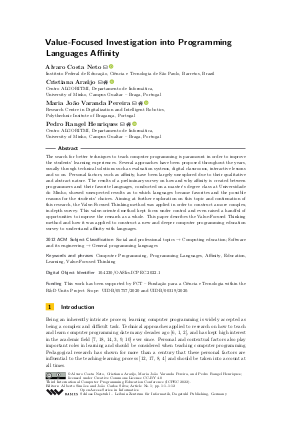Value-Focused Investigation into Programming Languages Affinity
Authors
Alvaro Costa Neto  ,
Cristiana Araújo
,
Cristiana Araújo  ,
Maria João Varanda Pereira
,
Maria João Varanda Pereira  ,
Pedro Rangel Henriques
,
Pedro Rangel Henriques 
-
Part of:
Volume:
Third International Computer Programming Education Conference (ICPEC 2022)
Part of: Series: Open Access Series in Informatics (OASIcs)
Part of: Conference: International Computer Programming Education Conference (ICPEC) - License:
 Creative Commons Attribution 4.0 International license
Creative Commons Attribution 4.0 International license
- Publication Date: 2022-07-11
File

PDF
OASIcs.ICPEC.2022.1.pdf
- Filesize: 0.5 MB
- 12 pages
Document Identifiers
Subject Classification
ACM Subject Classification
- Social and professional topics → Computing education
- Software and its engineering → General programming languages
Keywords
- Computer Programming
- Programming Languages
- Affinity
- Education
- Learning
- Value-Focused Thinking
Metrics
- Access Statistics
-
Total Accesses (updated on a weekly basis)
0Document
0Metadata
Abstract
The search for better techniques to teach computer programming is paramount in order to improve the students' learning experiences. Several approaches have been proposed throughout the years, usually through technical solutions such as evaluation systems, digital classrooms, interactive lessons and so on. Personal factors, such as affinity, have been largely unexplored due to their qualitative and abstract nature. The results of a preliminary survey on how and why affinity is created between programmers and their favorite languages, conducted on a master’s degree class at Universidade do Minho, showed unexpected results as to which languages became favorites and the possible reasons for the students' choices. Aiming at further exploration on this topic and continuation of this research, the Value-Focused Thinking method was applied in order to construct a more complex, in-depth survey. This value-oriented method kept focus under control and even raised a handful of opportunities to improve the research as a whole. This paper describes the Value-Focused Thinking method and how it was applied to construct a new and deeper computer programming education survey to understand affinity with languages.
Cite As Get BibTex
Alvaro Costa Neto, Cristiana Araújo, Maria João Varanda Pereira, and Pedro Rangel Henriques. Value-Focused Investigation into Programming Languages Affinity. In Third International Computer Programming Education Conference (ICPEC 2022). Open Access Series in Informatics (OASIcs), Volume 102, pp. 1:1-1:12, Schloss Dagstuhl – Leibniz-Zentrum für Informatik (2022)
https://doi.org/10.4230/OASIcs.ICPEC.2022.1
BibTex
@InProceedings{costaneto_et_al:OASIcs.ICPEC.2022.1,
author = {Costa Neto, Alvaro and Ara\'{u}jo, Cristiana and Pereira, Maria Jo\~{a}o Varanda and Henriques, Pedro Rangel},
title = {{Value-Focused Investigation into Programming Languages Affinity}},
booktitle = {Third International Computer Programming Education Conference (ICPEC 2022)},
pages = {1:1--1:12},
series = {Open Access Series in Informatics (OASIcs)},
ISBN = {978-3-95977-229-7},
ISSN = {2190-6807},
year = {2022},
volume = {102},
editor = {Sim\~{o}es, Alberto and Silva, Jo\~{a}o Carlos},
publisher = {Schloss Dagstuhl -- Leibniz-Zentrum f{\"u}r Informatik},
address = {Dagstuhl, Germany},
URL = {https://drops.dagstuhl.de/entities/document/10.4230/OASIcs.ICPEC.2022.1},
URN = {urn:nbn:de:0030-drops-166051},
doi = {10.4230/OASIcs.ICPEC.2022.1},
annote = {Keywords: Computer Programming, Programming Languages, Affinity, Education, Learning, Value-Focused Thinking}
}
Author Details
- Instituto Federal de Educação, Ciência e Tecnologia de São Paulo, Barretos, Brazil
- Centro ALGORITMI, Departamento de Informática, University of Minho, Campus Gualtar - Braga, Portugal
- Research Centre in Digitalization and Intelligent Robotics, Polythechnic Insitute of Bragança, Portugal
Funding
This work has been supported by FCT - Fundação para a Ciência e Tecnologia within the R&D Units Project Scope: UIDB/05757/2020 and UIDB/00319/2020.
References
- M. V. P. Almeida, L. M. Alves, M. J. V. Pereira, and G. A. R. Barbosa. EasyCoding - Methodology to Support Programming Learning. In Ricardo Queirós, Filipe Portela, Mário Pinto, and Alberto Simões, editors, First International Computer Programming Education Conference (ICPEC 2020), volume 81 of OpenAccess Series in Informatics (OASIcs), pages 1:1-1:8, Dagstuhl, Germany, 2020. Schloss Dagstuhl-Leibniz-Zentrum für Informatik. URL: https://doi.org/10.4230/OASIcs.ICPEC.2020.1.
-
M.V.P. Almeida. Easycoding: Methodology to support programming learning. Master’s thesis, Instituto Politécnico de Bragança, 2020.

- A.G. Applin. Second language acquisition and cs1. SIGCSE Bull., 33(1):174-178, February 2001. URL: https://doi.org/10.1145/366413.364579.
-
D.R. Barbosa. Adequacy Analysis of Learning Resources in Adult Education. Master’s thesis, Minho University, Braga, Portugal, October 2021.

- Council of Europe. Common European Framework of Reference for Languages: Learning, teaching, assessment – Companion volume. Council of Europe Publishing, Strasbourg, France, 2020. URL: https://www.coe.int/lang-cefr.
- R.R. Fenichel, J. Weizenbaum, and J.C. Yochelson. A program to teach programming. Communications of the ACM, 13(3):141-146, March 1970. URL: https://doi.org/10.1145/362052.362053.
- J. Figueiredo and F.J. García-Peñalvo. Building skills in introductory programming. In Proceedings of the Sixth International Conference on Technological Ecosystems for Enhancing Multiculturality, TEEM'18, pages 46-50, New York, NY, USA, 2018. Association for Computing Machinery. URL: https://doi.org/10.1145/3284179.3284190.
-
P. Freire. Pedagogia da Autonomia: Saberes necessários à prática educativa. Paz e Terra, 2011.

-
A. Gomes and A.J. Mendes. Learning to program: difficulties and solutions. In Proceedings of the 2007 ICEE International Conference on Engineering and Education, ICEE '07. International Network on Engineering Education and Research, 2007.

-
P.J. Guo. Non-native english speakers learning computer programming: Barriers, desires, and design opportunities. In Proceedings of the 2018 CHI Conference on Human Factors in Computing Systems, CHI '18, pages 1-14, New York, NY, USA, 2018. Association for Computing Machinery.

- Ralph L. Keeney. Value-focused thinking: Identifying decision opportunities and creating alternatives. European Journal of Operational Research, 92(3):537-549, 1996. URL: https://doi.org/10.1016/0377-2217(96)00004-5.
-
J. Piaget, M. Piercy, and D.E. Berlyne. The Psychology of Intelligence. Routledge classics. Routledge, 2001.

-
Redacted. Redacted for blind review purposes. In Redacted for blind review purposes, Redacted.

- S.A. Robertson and M.P. Lee. The application of second natural language acquisition pedagogy to the teaching of programming languages—a research agenda. SIGCSE Bulletin, 27(4):9-12, December 1995. URL: https://doi.org/10.1145/216511.216517.
- Stack Overflow. Stack overflow developer survey, 2021. URL: https://insights.stackoverflow.com/survey/2021.
- StatisticsTimes.com. Top computer languages, 2020. URL: http://statisticstimes.com/tech/top-computer-languages.php.
-
L.S. Vygotsky, E. Hanfmann, G. Vakar, and A. Kozulin. Thought and Language. The MIT Press. MIT Press, 2012.

- B.C. Wilson and S. Shrock. Contributing to success in an introductory computer science course: A study of twelve factors. In Proceedings of the Thirty-Second SIGCSE Technical Symposium on Computer Science Education, SIGCSE '01, pages 184-188, New York, NY, USA, 2001. Association for Computing Machinery. URL: https://doi.org/10.1145/364447.364581.
